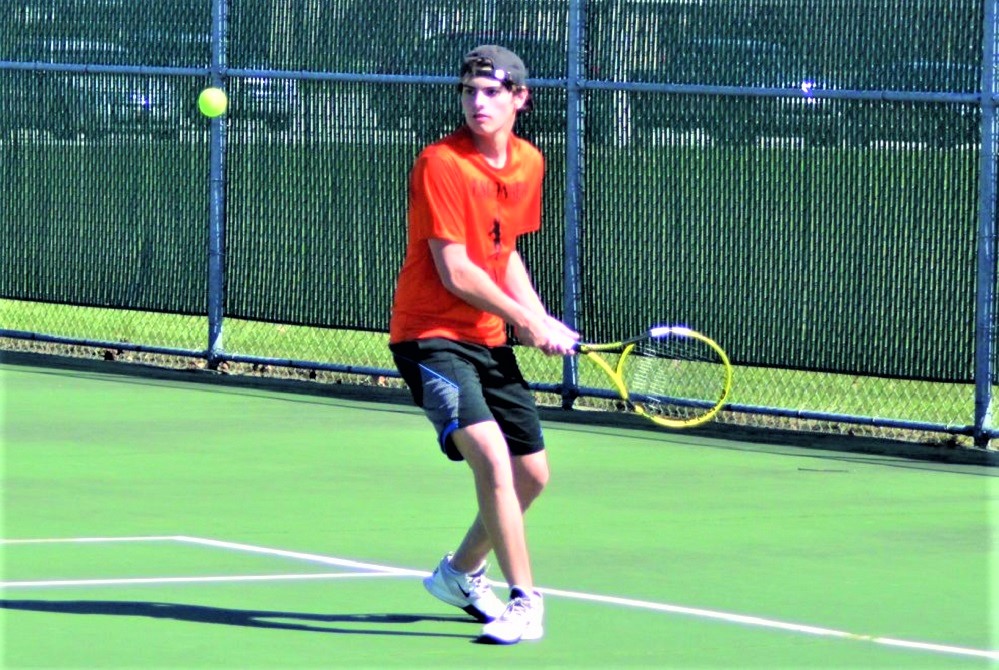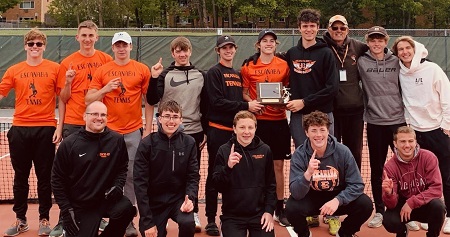
Fearless Approach, Memorable Finish
By
Geoff Kimmerly
MHSAA.com senior editor
October 18, 2012
Billy Heckman has known Davis Crocker for a while. Sharing a corner of Michigan’s tennis community, they’ve crossed paths at USTA tournaments, played each other once two winters ago, and were teammates on a junior Davis Cup team. They plan on hitting together this winter.
And to be honest, Heckman remembers being a little afraid of Davis’ game – the big serve and big volleys that helped the Kalamazoo Loy Norrix senior win the MHSAA Division 2 championship at No. 1 singles last season.
But Heckman felt no fear at last week’s Regional at Portage Northern.
“I was thinking to myself, this is my senior year and I want to end it with a bang,” Heckman said.
The Portage Central senior has two more days left in his high school career. But it’s fair to say that regardless of what happens at this weekend’s MHSAA Lower Peninsula Finals in Holly, Heckman’s straight-set win over Crocker in the Regional Final will be a memorable moment he’ll hold onto forever.
Heckman receives a Second Half High 5 this week after downing Crocker 7-6 (5), 6-1. The loss was Crocker’s first, against 26 wins, and more or less guaranteed Heckman the top seed this weekend.
“It felt great because it was my last Regional,” Heckman said. “No matter what happens at states, I won the Regional and he can’t take that away from me.”
Heckman is 25-4 this season – although three of those losses came when a back injury forced him into a default and two forfeits. The other loss came to Ann Arbor Huron’s Jack Peterson, the fourth-seeded No. 1 singles player in Division 1.
An experience and an evolution helped set Heckman up to finish his high school career on top. A year ago, he faced Midland Dow’s Jonathan Gurnee in the MHSAA championship match at No. 2 singles. Heckman had beaten Gurnee badly earlier that season, 6-0, 6-0, but at the Finals ended up becoming the final high school win for the player with the most for a career according to the MHSAA record book.
“At first I was just devastated. I’d beaten him 0, 0 a month before, and there was no way I was going to lose,” Heckman remembered. “I was the one seed, and I was going in with a lot of confidence.
“Not to take anything away from him, but that day I just played really badly. It made me want to work harder, especially for high school season. You can’t go in knowing you’re going to win.”
But a player can prepare. And doing so led to a big jump in Heckman’s evolution this summer.
He admits he was like most freshmen and sophomores, immature, joking around too much and “just being annoying.” He’s always had talent; he’s played No. 3 singles or higher all four years for one of the state’s top programs. But after last season, he decided it was time to put the team first.
A busy two months of running tennis tournaments plus a death in the family kept Portage Central coach Peter Militzer from being as involved as usual with the team’s traditional summer hitting workouts. So Heckman volunteered to organize, started a Facebook group to get the word out, and soon had 20-25 players training three times a week. During summers past, that number was usually 8-10.
“JV kids started coming, and there were more kids in the group than at any of the clubs around here,” Heckman said.
“I like to think of myself as (a leader). I just like especially when people can see results, and I contributed toward that.”
He saw plenty in his game as well. ITA tournaments during the summer in Kalamazoo, Bloomington, Ind., and Columbus, Ohio, allowed him opportunities to face bigger, older competitors.
Heckman also grew the last two years – finally, and in a giant burst. Militzer said Heckman was the size of a 10-year-old until he was nearly 16. More size meant power and the ability to play more of an offensive game.
Militzer calls Heckman “unbelievably quick” and one of the smartest tennis players he’s coached – pretty powerful words considering Militzer has coached two MHSAA championship teams.
“I call him a tennis addict. He’s passionate about the game, and of all the boys I’ve coached, he’s got the best tennis IQ,” Militzer said. “On the court, he senses what opponents do not like to do and repeatedly makes them do that. He makes them hit shots they don’t want to hit.”
Heckman was up 5-4 in the first set against Crocker, but pulled back on his attack. He realized quickly he shouldn’t have, and didn’t hold back the rest of the match.
And he surely won’t if they meet again this weekend.
“I didn’t think I’d win the first set, honestly. (But) I knew right from the beginning of the second set that I had to get up from the beginning and not give him (a chance to come back),” Heckman said.
“I’m pretty sure I’ll see him at the Finals again. I’m expecting it.”
PHOTO: Portage Central's Billy Heckman returns a shot during last season's Division 2 Final at No. 2 singles against Midland Dow's Jonathan Gurnee.

GNC Champ Escanaba Hoping to Serve Up More History
By
John Vrancic
Special for MHSAA.com
June 2, 2021
ESCANABA — Fourteen years have passed since the Escanaba boys were last crowned Upper Peninsula tennis champions.
 The Eskymos, fresh from earning their first Great Northern Conference title since 2003, will try to change that at today’s U.P. Division 1 Finals at Negaunee.
The Eskymos, fresh from earning their first Great Northern Conference title since 2003, will try to change that at today’s U.P. Division 1 Finals at Negaunee.
“We have a very nice opportunity ahead of us,” said fifth-year coach Tom Penegor. “We just went through a tough GNC meet (May 27 at Marquette). We’re hoping that will give us an edge in the U.P. Finals. I think we have some momentum.”
Standing in the way is five-time reigning champ Negaunee.
“They’ll be tough, and Marquette has good singles players,” said Penegor. “The other schools also have some good players. There’s pressure out there, and everybody responds to that differently. The game is just as much mental as physical. The scoring system is different from the GNC. You need every single point.”
The Eskymos have an all-junior singles lineup with Gunner Dlugas holding a 14-5 record at No. 1. Filling out singles are Shawn Beauchamp (13-7) at No. 2, Nathan Howes (15-3) at No. 3 and Connor Smale (10-2) at No. 4.
“It felt great to win the GNC,” said Dlugas, who among latest improvements to his game has made the transition from a two-handed to a one-handed backhand shot. “We hadn’t won the GNC since I was born. Four of us have played for two years, and the rest of the guys are first-year players. We’re a fresh team, and that’s why this is so important for us. We have a lot of No. 1 seeds and we’re definitely improving, which gives us a pretty good feeling going into the Finals. I think we’re ready to go.”
Also part of today’s lineup are senior Ryan Moreau and junior Viktor Pospisil, an exchange student from Mladá Boleslov in the Czech Republic, who together are 10-2 at No. 1 doubles.
 “I wasn’t supposed to play tennis, but I started playing with the guys at first, then decided to join the team,” said Popisil. “I had been playing in my hometown in Europe and appreciate having the opportunity to play here. I didn’t think we’d be this good at the beginning of the season, but everything kind of progressed as the season went on. We’ve been coming together as a team.”
“I wasn’t supposed to play tennis, but I started playing with the guys at first, then decided to join the team,” said Popisil. “I had been playing in my hometown in Europe and appreciate having the opportunity to play here. I didn’t think we’d be this good at the beginning of the season, but everything kind of progressed as the season went on. We’ve been coming together as a team.”
Moreau said he truly enjoys playing with his partner.
“Viktor’s a great player, and we’ve become great friends,” he added. “All the players from the other schools come up and talk to him.
“I’m real excited about the Finals. Negaunee has a great program. We’re coming in as kind of an underdog. We definitely have to play our game and take the title away from them. If we do that, we should take it.”
Junior Isaac Maki and sophomore Dawson Williams fill the No. 2 flight.
“This experience has been awesome,” said Williams. “I learned a lot about tennis and made a lot of new friends. This is actually my first high school sport. Our first match (this season) against Menominee was exciting. I didn’t know how it was going to go, but I thought we performed beyond expectations.
“Negaunee as a great team, and West Iron County is very good. I thank God for giving me the strength to play at a high level and Coach, my teammates and parents for all their encouragement and support. Winning the GNC gave us a boost going into the Finals.”
Joining them in the doubles lineup are seniors Tanner McDonald and Jordan Nance (13-1) at No. 3 and senior Brayden Roberts and junior Joe Hubert at No. 4.
Should the Eskymos prevail today, it would mark the first time they’d have won the GNC and U.P. Finals in the same year since 1999.
“We had four practices before the U.P. Finals,” said Penegor. “After the GNC meet, we asked the guys if they wanted to practice over the weekend and they decided they wanted to do that.
“Our team has worked hard, and our assistant coaches (Chris Ogren and Alan Adams) have been a tremendous asset to our team this year.”
Tennis is a self-supporting program at Escanaba, and Penegor said one of the reasons he took over after retiring from the city was out of love for the sport.
“We appreciate the support of our sponsors, and the parents have driven us to some of the meets,” said Penegor. “They’ve also been big supporters of our team.
“We started with four seniors. It’s nice to have a mixture of younger kids with our seniors. This is definitely the best mix we’ve had in my five years as coach. We stress to the kids the importance of having fun, making improvements and working on their game.”
 John Vrancic has covered high school sports in the Upper Peninsula since joining the Escanaba Daily Press staff in 1985. He is known most prominently across the peninsula for his extensive coverage of cross country and track & field that frequently appears in newspapers from the Wisconsin border to Lake Huron. He received the James Trethewey Award for Distinguished Service in 2015 from the Upper Peninsula Sportswriters and Sportscasters Association.
John Vrancic has covered high school sports in the Upper Peninsula since joining the Escanaba Daily Press staff in 1985. He is known most prominently across the peninsula for his extensive coverage of cross country and track & field that frequently appears in newspapers from the Wisconsin border to Lake Huron. He received the James Trethewey Award for Distinguished Service in 2015 from the Upper Peninsula Sportswriters and Sportscasters Association.
PHOTOS: (Top) Escanaba’s Ryan Moreau returns a volley this season against Ishpeming Westwood. (Middle) The Eskymos celebrate their Great Northern Conference championship. (Top photo courtesy of the Escanaba Daily Press; middle photo courtesy of the Escanaba athletic department.)

